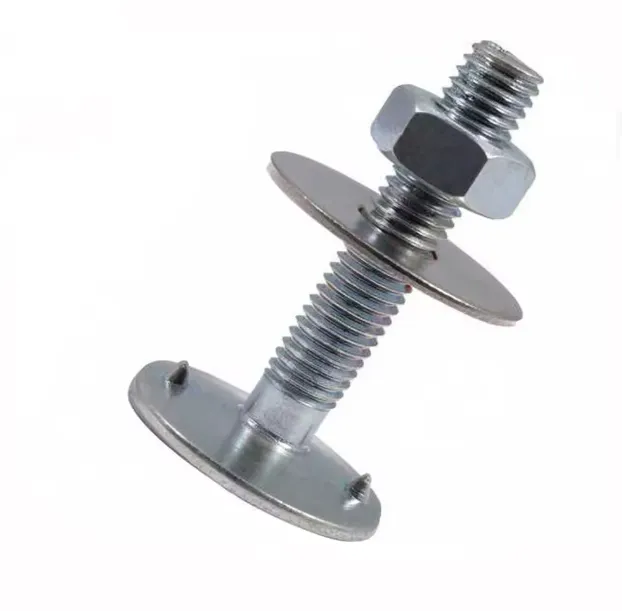

Understanding the Importance of Threaded Fasteners in Modern Engineering Applications
Nov . 25, 2024 00:10 Back to list
Understanding the Importance of Threaded Fasteners in Modern Engineering Applications
Understanding Threaded Fasteners A Comprehensive Overview
Threaded fasteners are essential components in various industries, serving as the backbone of countless assemblies. These mechanical parts, characterized by their helical ridges (or threads), provide secure connections between different materials, ensuring stability and reliability in numerous applications. In this article, we will explore the types, materials, applications, and advantages of threaded fasteners, highlighting their significance in modern engineering.
Types of Threaded Fasteners
Threaded fasteners come in various forms, each designed for specific applications. The most common types include
1. Bolts These are typically used in conjunction with a nut and are designed to secure two or more components tightly together. Bolts are available in various grades and sizes, making them versatile for different strength requirements.
2. Screws Unlike bolts, screws are designed to directly engage with the material they are fastening. They can be used in wood, metal, or plastic and come in various designs, including self-tapping screws that create their own threads as they are driven into the material.
3. Nuts Nuts are internally threaded fasteners that pair with bolts to create a secure fastening system. They come in various shapes and sizes, with hexagonal nuts being the most widely used.
4. Washers Though not threaded themselves, washers are often used in combination with threaded fasteners to distribute loads, prevent leaks, and protect surfaces from damage.
5. Studs These are threaded rods without a head on one end, used to fasten two components by being threaded into both.
6. Capscrews Similar to bolts, capscrews have an internal drive feature (such as a hex or socket) and are used for more specific applications requiring a higher level of precision.
Materials Used in Threaded Fasteners
Threaded fasteners can be fabricated from a wide range of materials, each selected based on the application’s requirements
- Carbon Steel This is one of the most common materials for fasteners due to its strength and cost-effectiveness. It is often coated to resist corrosion. - Stainless Steel Renowned for its corrosion resistance, stainless steel is often used in applications exposed to moisture and chemicals.
- Aluminum Lightweight and resistant to corrosion, aluminum fasteners are suitable for applications where weight reduction is critical. - Plastic Used in non-load-bearing applications, plastic fasteners are lightweight, resistant to corrosion, and non-conductive.
threaded fasteners

Applications of Threaded Fasteners
Threaded fasteners find applications across a diverse range of industries, including
- Automotive Used in assembling engines, chassis, suspension systems, and other vital components.
- Aerospace Critical in maintaining the integrity of aircraft, threaded fasteners are designed to withstand extreme conditions.
- Construction Essential in building structures, threaded fasteners secure beams, trusses, and other heavy materials.
- Electronics Often used to assemble various electronic devices, ensuring components are securely held in place.
Advantages of Threaded Fasteners
1. Ease of Use Threaded fasteners offer straightforward installation and removal, making maintenance and repairs simple.
2. Strength and Durability Designed to withstand significant loads and stresses, quality threaded fasteners contribute to the overall endurance of an assembly.
3. Versatility With various types, sizes, and materials available, threaded fasteners can adapt to numerous settings and requirements.
4. Cost-Effectiveness Relatively inexpensive, threaded fasteners are economical choices for assembling and securing components.
Conclusion
In conclusion, threaded fasteners play a critical role in numerous industries, underpinning the functionality and structural integrity of countless products and systems. Understanding the types, materials, applications, and advantages of these fasteners helps engineers and designers make informed choices, ensuring safe and effective designs. As technology continues to evolve, threaded fasteners will remain an indispensable element of engineering and manufacturing processes, adapting to new challenges and innovations in the ever-evolving industrial landscape.
Latest news
-
High-Strength Hot Dip Galvanized Bolts - Hebei Longze | Corrosion Resistance, Customization
NewsJul.30,2025
-
Hot Dip Galvanized Bolts-Hebei Longze|Corrosion Resistance&High Strength
NewsJul.30,2025
-
High-Strength Hot-Dip Galvanized Bolts-Hebei Longze|Corrosion Resistance&High Strength
NewsJul.30,2025
-
Hot Dip Galvanized Bolts-Hebei Longze|Corrosion Resistance&High Strength
NewsJul.30,2025
-
Hot Dip Galvanized Bolts - Hebei Longze | Corrosion Resistance, High Strength
NewsJul.30,2025
-
High-Strength Hot Dip Galvanized Bolts-Hebei Longze|Corrosion Resistance, Grade 8.8
NewsJul.30,2025

